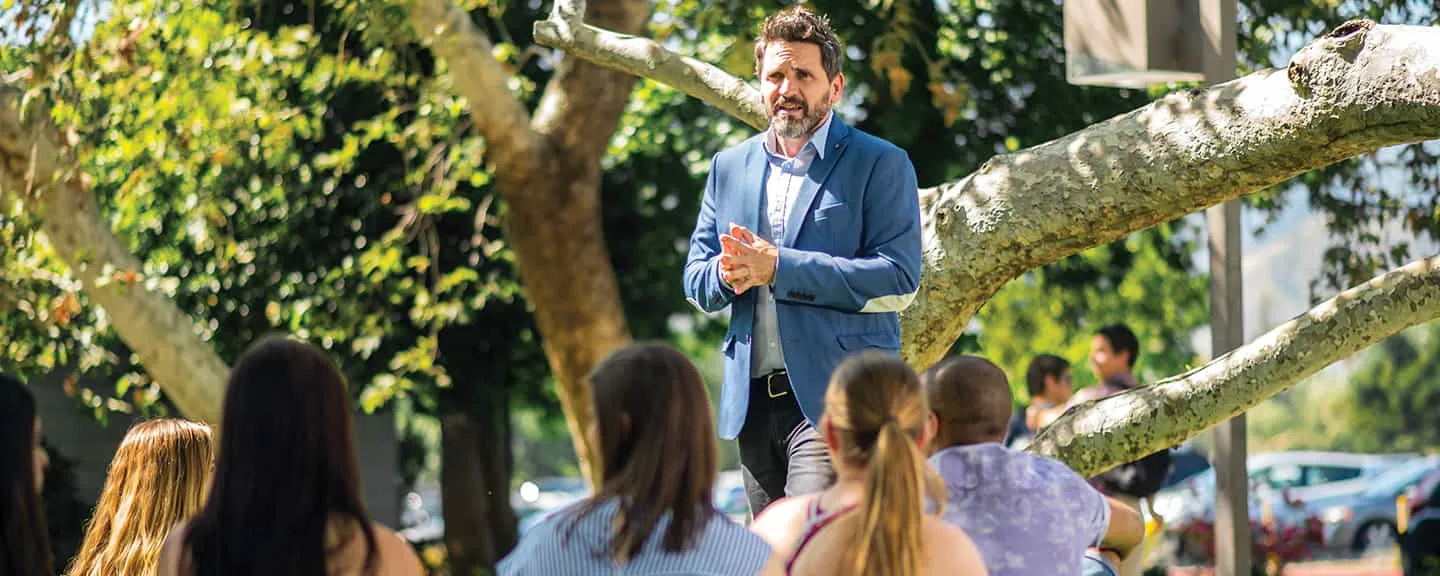- Home
- >
- APU Articles
- >
- News Article
Academic Faith Integration: An APU Distinctive
September 18, 2017 | Written By Paul Kaak, Ph.D.

To understand the profundity of full-scale, in-depth faith integration, the critical relationship between Christianity and academia must be understood. The historic Christian faith, a rich and vast treasure of wisdom and knowledge, offers paradigm-shaping connections to the many subjects encountered by students in higher education. All sociology and nursing students study suffering, but students at our Christian institution learn about a kind of compassion that goes deeper than pity. Christian scholars of rhetoric will evoke the instruction of Aristotle and the wisdom of St. Augustine. A faith-based finance curriculum involves more than calculations and budget development; it provides instruction for the stewarding of God’s resources and practicing grace-inspired generosity.
In his book Remembering the Christian Past (William B. Eerdmans Publishing Company, 1995), Robert Wilken stated, “Christian truth has been handed on through a learned tradition in which it has been formulated, criticized, analyzed, refined, and tested by experience.” Many academic institutions, however, overlook, and even prohibit, the deep insights of the Christian story and its various traditions, putting their graduates at a significant disadvantage as they engage the global conversation. APU graduates, on the other hand, leave campus equipped with the advantages that accompany a faith-oriented perspective captured when the wisdom that emanates from our sacred text and the advances of current scholarship are thoughtfully integrated.
From this foundation, APU students wrestle with challenging questions aimed at discovering and clarifying deeper truths within the subjects they study: How does Christian wisdom add new dimensions to the data of my discipline? How does God’s provision of general revelation—available to all people—come into conversation with the special revelation of the Scripture? How have thoughtful Christians clarified and deepened our understanding of academic and professional knowledge and practice across time? How should I engage in faithful learning and faith-informed working within my area of calling?
To address these questions, academic faith integration must take a form different from the kind of spiritual inspiration a student may get from a dynamic Christian speaker. God’s truth is not limited to what the preacher offers in a weekend church service or a weekday chapel event. Academic faith integration offers a robust rebuttal to the tendency to separate the sacred from the secular. It challenges APU faculty to call on centuries of Christian thinking in addressing issues central to their academic, artistic, and professional fields. And although faith integration carries a family resemblance across the university, it manifests itself differently in each classroom, with each faculty member, and across disciplines. In order to keep this critical task central to our mission as a Christian university, the Office of Faith Integration has been charged to come alongside APU faculty, department chairs, and deans to provide encouragement, resources, and support.
Examples of solid integration are myriad. At a recent Faith Integration LIVE! luncheon, sponsored by the Faith Integration Council, Randy Wallace, Ph.D., associate professor and associate dean for regional campus business programs, posited that the virtues of the Christian faith offer the precise resources that make prospective employees employable. Carol Hines, Ph.D., assistant professor in the Department of Teacher Education, prepares special education teachers. In her presentation, she explained how the patriarchs of early Christianity offered theological validation for caring for vulnerable populations. And Monica Ganas, Ph.D., professor in the School of Visual and Performing Arts, and her acting students demonstrated the powerful faith-infused learning that emerged from bringing C.S. Lewis’ book The Great Divorce (HarperCollins, 1946) to the APU stage.
Concerted efforts like these instill graduates with confidence and conviction as they enter the next phases of their professional and educational lives. English major Anika Mizel ’14, now a law student at Yale University, said, “APU taught me that the Bible can be a resource in any classroom. Although I cannot quote the Bible in law school the way I could at APU, I find that I still rely on its insights into the human experience and on certain truths it conveys to help me understand legal frameworks and rationales. The Bible has held valuable insights for me in my study of the law, and I am grateful to APU for providing practice ground for faith/discipline integration.”
Mizel’s experience affirms the two sides of academic freedom found in institutions of higher learning: exposure to diverse viewpoints and passionate pursuit of truth. As philosopher Paul Gould noted, “Christian scholars should be principled pluralists in the academy—allowing, even encouraging, various perspectives to compete in the marketplace of ideas for the mantle of truth. Such a posture requires the conviction that ultimately truth is found within a Christian view of reality and intellectual humility.” The integration of Christian faith and academic disciplines, professional programs, and arts education provides students with a fuller, bigger education. Students—whether disciples of Jesus or not—should finish their time at APU with a broader and deeper grasp of truth, beauty, and goodness, especially in their area of study, through reflection on how various Christian traditions have struggled to make sense of that subject. Because God is the Source of all knowledge, APU faculty seek His truth in all things, and they look for ever-more-effective ways to engage their students and their fellow scholars in the pursuit of Christ Himself, “in whom are hidden all the treasures of wisdom and knowledge” (Colossians 2:3, NIV).